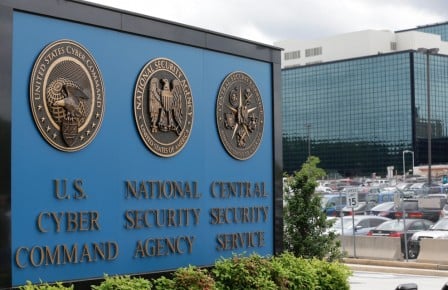The NSA Wants Tech Companies To Give It “Front Door” Access To Encrypted Data
 National Security Agency officials are considering a range of options to ensure their surveillance efforts aren’t stymied by the growing use of encryption, particularly in smartphones. Key among the solutions, according to The Washington Post, might be a requirement that technology companies create a digital key that can open any locked device to obtain text messages or other content, but divide the key into pieces so no one group could use it without the cooperation of other parties.
National Security Agency officials are considering a range of options to ensure their surveillance efforts aren’t stymied by the growing use of encryption, particularly in smartphones. Key among the solutions, according to The Washington Post, might be a requirement that technology companies create a digital key that can open any locked device to obtain text messages or other content, but divide the key into pieces so no one group could use it without the cooperation of other parties.
“I don’t want a back door,” Adm. Michael S. Rogers, director of the NSA, recently said during a speech at Princeton University, at which he laid out the proposal. “I want a front door. And I want the front door to have multiple locks. Big locks.”
The proposal is part of a tense debate resulting from the growing number of companies that endow their hardware and software with strong encryption that when used properly makes it infeasible if not impossible for anyone other than the owner to access the contents. Chief among these companies is Apple, which has enabled such encryption by default in newer iPhones and iPads. On the one hand, national security and law enforcement officials say the trend could seriously hinder criminal and national security investigations. Tech industry representatives, meanwhile, chafe at the thought of backdoors, citing a raft of concerns, including abuse by hackers, government overreach, and harm to US competitiveness.
As reporters Ellen Nakashima and Barton Gellman wrote:
Tech industry officials and privacy advocates take a different view. “I don’t believe that law enforcement has an absolute right to gain access to every way in which two people may choose to communicate,” said Marc Zwillinger, an attorney working for tech companies on encryption-related matters and a former Justice Department official. “And I don’t think our Founding Fathers would think so, either. The fact that the Constitution offers a process for obtaining a search warrant where there is probable cause is not support for the notion that it should be illegal to make an unbreakable lock. These are two distinct concepts.”
Critics have also raised concerns that any type of portal that gives government officials access to encrypted contents has a strong likelihood of backfiring. They said criminals or spies from hostile countries may exploit the weaknesses to obtain classified or confidential data, possibly on a mass scale. The split-key approach floated by Rogers, for instance, requires a complicated system to allocate the keys, deliver them to each involved party, recombine them when a legitimate court order is issued, and destroy the key once it was used. “Get any part of that wrong and all your guarantees go out the window,” Matt Green, a Johns Hopkins University professor and an expert in cryptography, told The Washington Post.
The approach is only one of several options being studied by the White House. One alternative under consideration would have a judge direct a company to set up a mirror account so that law enforcement officials conducting a criminal investigation could read text messages shortly after they are sent. To obtain encrypted photos, the judge could order the company to back up the suspect’s data to a server while the phone is turned on and its contents are unencrypted.
White House aides hope to report to the president this month.
